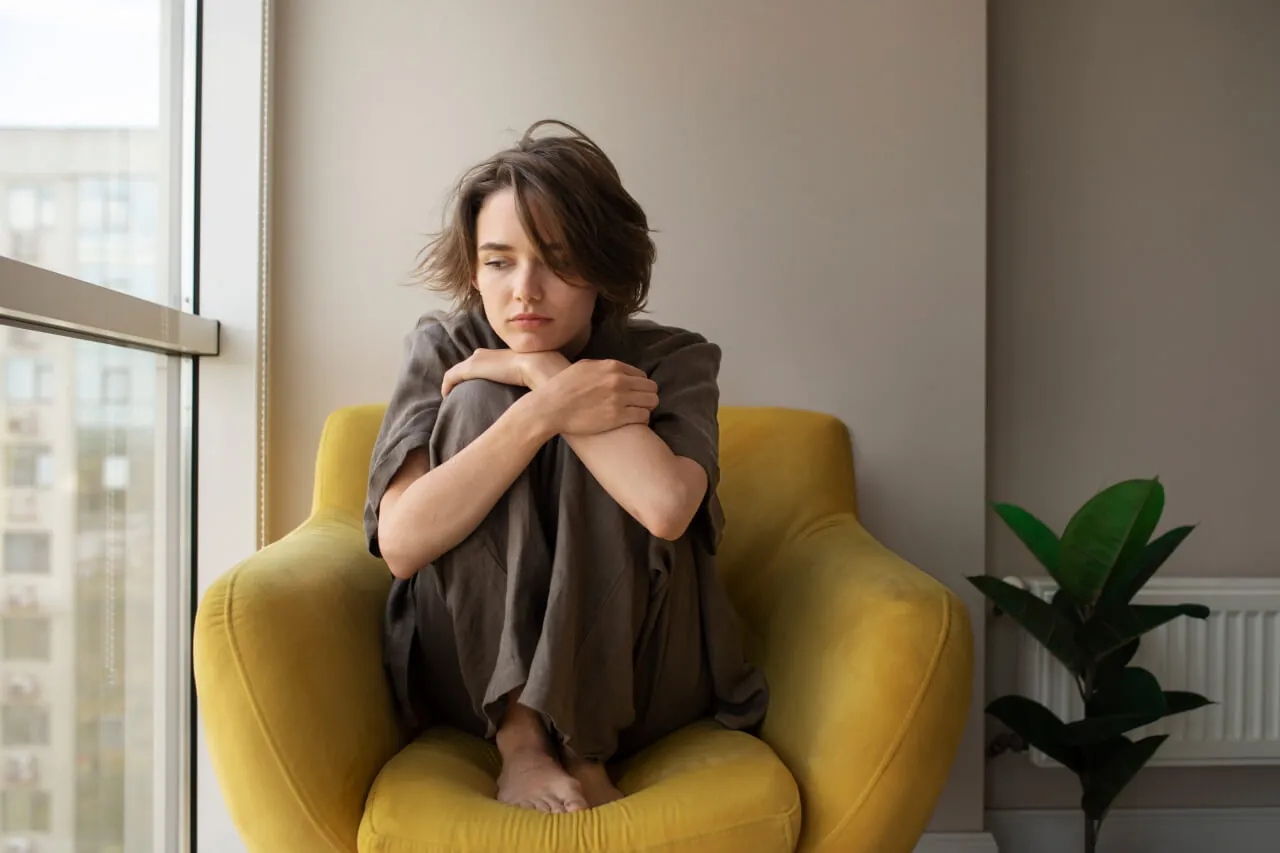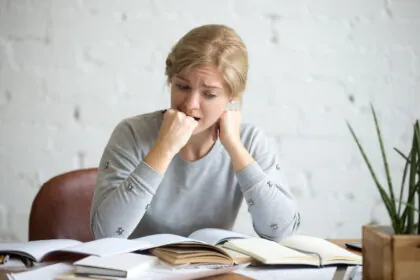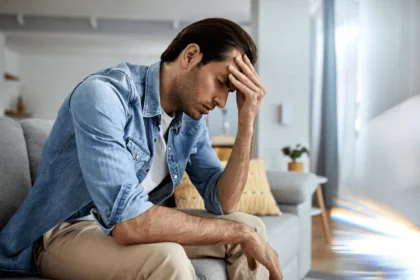In the hustle and bustle of our modern lives, achieving a restful night’s sleep seems like an elusive dream for many.
One culprit often lurking in the shadows is anxiety, a silent disruptor that can wreak havoc on our sleep patterns.
Anxiety often messes with our sleep.
When we’re overly worried or scared, catching those Zzz’s becomes a real challenge.
It’s not just about the struggle to doze off; it’s also about staying asleep.
And here’s the tricky part – not getting enough sleep can actually crank up our anxiety levels.
It’s like a not-so-friendly loop where anxiety and sleep troubles keep feeding off each other.
In the U.S., anxiety disorders take the lead as the most common mental health hiccup.
And guess what?
Not getting enough shut-eye doesn’t just mess with our mood; it throws a wrench into our overall health.
That’s why it’s super important to get how anxiety and sleep are like these interconnected puzzle pieces.
Solving this puzzle isn’t just about feeling better emotionally; it’s a big deal for our physical health too.
So, let’s dive into the link between anxiety and sleep – it might just be the key to keeping both our minds and bodies in check.
Anxiety is like an unwanted guest that overstays its welcome in our minds. It’s more than just feeling a bit nervous or stressed—it’s a persistent worry or fear that can be hard to shake off.
Imagine a buzzing undercurrent of unease that hangs around, making everyday life a bit more challenging.
Now, let’s talk symptoms.
Anxiety has its own way of making its presence known, and it can show up in various forms.
It might start with a rapid heartbeat or sweaty palms.
You might feel tense, on edge, or irritable for no apparent reason.
Sometimes, it plays tricks on your mind, making you imagine the worst-case scenarios.
Physical symptoms are also part of the anxiety package.
Ever felt a knot in your stomach, or maybe your muscles tensing up?
That’s anxiety’s doing. It can mess with your sleep, appetite, and even give you headaches.
In a nutshell, anxiety isn’t just a fleeting worry; it’s a persistent and sometimes overwhelming feeling that affects both your mind and body.
Then, What is Insomnia?
Insomnia is like the unwelcome gatecrasher at the sleep party.
It’s when you have a tough time falling asleep, staying asleep, or getting quality rest that leaves you refreshed.
Imagine lying in bed, wanting desperately to doze off, but your mind decides it’s time for a midnight marathon of thoughts instead.
There are different types of insomnia.
Short-term insomnia might drop by for a brief stay, perhaps triggered by stress or a change in your routine.
On the other hand, chronic insomnia is the long-term tenant that just won’t budge, sticking around for at least three nights a week for a good month or more.
Insomnia doesn’t just play games with your night; it loves to affect your daytime too.
It can leave you feeling groggy, irritable, and just not your usual self.
Concentrating at work or enjoying daily activities can become a bit of a struggle when insomnia decides to crash the scene.
So, in simple terms, insomnia is like the annoying friend who messes up your sleep plans, leaving you tired and a bit frazzled during the day.
Understanding it is key to finding ways to show this sleep disrupter the exit door.
The Link Between Anxiety and Sleep
Imagine anxiety and sleep troubles as dance partners—sometimes stepping on each other’s toes, other times twirling in a chaotic waltz.
Here’s the breakdown:
Anxiety’s Nighttime Chatter: Anxiety loves to chat, especially when it’s time to sleep.
It brings along worries and thoughts that refuse to quiet down, making it tricky to relax and doze off.
The Insomnia Tango: Enter insomnia, anxiety’s dance partner.
It’s the reason behind tossing and turning, waking up at odd hours, or just not getting that solid, uninterrupted sleep.
A real sleep disrupter!
Hormones in the Mix: Anxiety messes with our hormonal harmony.
Cortisol, the stress hormone, decides to party at night, making the usual wind-down for sleep a bit of a challenge.
Physical Guests at Night: Anxiety often brings along physical symptoms like sweaty palms or a racing heart.
These guests don’t just visit during the day; they stick around, disrupting our sleep.
Dreamland’s Makeover: Anxiety decides to redecorate our dreams. From vivid dreams to nightmares, our usual peaceful night’s sleep might get a bit of a makeover.
Understanding this connection is like learning the steps to a dance.
It’s not just about knowing the moves; it’s about finding ways to make the dance smoother.
From calming bedtime routines to dealing with anxious thoughts, we’re about to dive into the steps of this connection.
How to Sleep Safely with Anxiety
Create a Calming Bedtime Routine
Establish a routine that signals to your body that it’s time to wind down.
This could include activities like reading a book, taking a warm bath, or practicing gentle stretching exercises.
Mindfulness and Relaxation Techniques
Incorporate mindfulness or relaxation exercises to quieten a busy mind.
Techniques such as deep breathing, progressive muscle relaxation, or guided imagery can help shift your focus away from anxious thoughts.
Limit Screen Time Before Bed
Reduce exposure to screens (phones, tablets, computers) at least an hour before bedtime.
The blue light emitted from screens can interfere with the production of the sleep-inducing hormone melatonin.
Create a Comfortable Sleep Environment
Ensure your bedroom is conducive to sleep.
Keep the room cool, dark, and quiet. Invest in a comfortable mattress and pillows, and consider using blackout curtains if external lights are a disturbance.
Manage Stimulants
Limit caffeine and nicotine intake, especially in the hours leading up to bedtime.
These stimulants can exacerbate anxiety and interfere with the ability to fall asleep.
Journaling
Write down your thoughts or worries in a journal before bedtime.
This can help unload your mind and reduce the tendency to ruminate on anxious thoughts as you try to sleep.
Stay Consistent with Sleep Schedule
Maintain a consistent sleep schedule by going to bed and waking up at the same time each day.
Consistency helps regulate your body’s internal clock and improves the quality of sleep.
Use Relaxing Sleep Aids
Consider natural sleep aids like herbal teas (chamomile or valerian root) or essential oils (lavender) known for their calming effects.
Consult with a healthcare professional before trying any new supplements.
Limit Fluid Intake Before Bed
Minimize the consumption of liquids close to bedtime to avoid disruptions from trips to the bathroom during the night.
Seek Professional Help
If anxiety consistently interferes with your ability to sleep, consider consulting with a healthcare provider or mental health professional.
They can provide personalized guidance and explore potential treatment options.
Remedies to Help You Sleep Well with Anxiety
Absolutely, Here are some remedies to help you sleep well despite dealing with anxiety:
1. Herbal Teas
Sip on calming herbal teas like chamomile or valerian root in the evening.
These teas contain natural compounds known for their relaxing effects.
2. Aromatherapy
Use essential oils like lavender or bergamot in a diffuser or as part of a bedtime routine.
The soothing scents can create a calming atmosphere conducive to sleep.
3. Weighted Blankets
Consider using a weighted blanket.
The gentle pressure from the blanket can have a calming effect, promoting a sense of security and relaxation.
4. Guided Imagery or Meditation Apps
Explore apps that offer guided imagery or meditation specifically designed to help with sleep. These can guide your mind away from anxious thoughts and into a more peaceful state.
5. White Noise Machines
Use white noise machines or apps to create a consistent, soothing background noise.
This can drown out other sounds that might trigger anxiety and help you maintain a more serene sleep environment.
6.Limit Evening Stimuli
Minimize exposure to stimulating activities or news before bedtime.
Opt for calming activities like reading a book or listening to soft music instead.
7. Progressive Muscle Relaxation (PMR)
Practice PMR, a technique involving tensing and then releasing different muscle groups to promote physical relaxation.
This can help release tension built up during the day.
8. Limit Naps
If you find it hard to sleep at night, try to limit daytime naps to avoid disrupting your nighttime sleep pattern.
9. Cognitive Behavioral Therapy for Insomnia (CBT-I)
Consider seeking guidance from a mental health professional trained in CBT-I.
This type of therapy addresses the thoughts and behaviors affecting your sleep and can be particularly effective for anxiety-related sleep issues.
10. Create a Comfortable Sleep Environment
Make sure your bedroom is a comfortable, relaxing space.
Invest in comfortable bedding, ensure the room is cool and dark, and eliminate potential disturbances.
11.Stay Active During the Day
Engage in regular physical activity during the day, but avoid intense exercise close to bedtime.
Exercise can help alleviate anxiety and contribute to better sleep.
12. Limit Caffeine and Sugar Intake
Be mindful of your caffeine and sugar intake, especially in the hours leading up to bedtime.
These substances can interfere with sleep.
Remember, the key is to experiment and find what works best for you.
Incorporating a combination of these remedies into your routine may help create a more conducive environment for restful sleep despite dealing with anxiety.
Conclusion
In conclusion, the intricate dance between anxiety and sleep disorders impacts not just our nights but our overall well-being.
Understanding this link empowers us to take proactive steps toward a more restful life.
By recognizing the signs of anxiety, acknowledging the disruptions caused by insomnia, and implementing practical strategies, we can create a harmonious balance.
From calming bedtime routines and mindfulness techniques to exploring professional guidance, the journey to restful nights is a personalized one.
It’s not just about improving sleep; it’s about enhancing our physical and emotional health.
As we navigate this link, let’s embrace the tools available—whether it’s the calming aroma of lavender, the gentle pressure of a weighted blanket, or the soothing power of guided imagery.
In the realm where anxiety and sleep intersect, our choices matter.
So, let’s choose to prioritize our well-being, understand the nuances of this connection, and weave a tapestry of restful nights for a more vibrant, healthier life.
Remember, the path to tranquility may have twists and turns, but with each intentional step, we move closer to the serenity of a truly restful life.
FAQs
What is the connection between anxiety and sleep disorders?
Anxiety and sleep disorders often go hand in hand. Anxiety can cause racing thoughts and persistent worry, making it difficult to fall asleep and stay asleep.
Can anxiety affect the quality of sleep?
Absolutely. Anxiety can lead to insomnia, frequent awakenings during the night, and restless sleep, impacting the overall quality of sleep.
How does anxiety influence nighttime symptoms?
Anxiety can manifest in physical symptoms like increased heart rate, sweating, and muscle tension, disrupting the body’s ability to relax for sleep.
Are there specific strategies to improve sleep with anxiety?
Yes, creating a calming bedtime routine, practicing relaxation techniques, and maintaining a consistent sleep schedule can help manage anxiety-related sleep issues.
Can professional help make a difference in sleep quality for those with anxiety?
Absolutely. Consulting with healthcare providers or mental health professionals can provide personalized guidance and explore potential treatment options to improve sleep.
What lifestyle changes can support better sleep amid anxiety?
Lifestyle changes include limiting screen time before bed, managing stimulant intake, staying active during the day, and creating a comfortable sleep environment.





